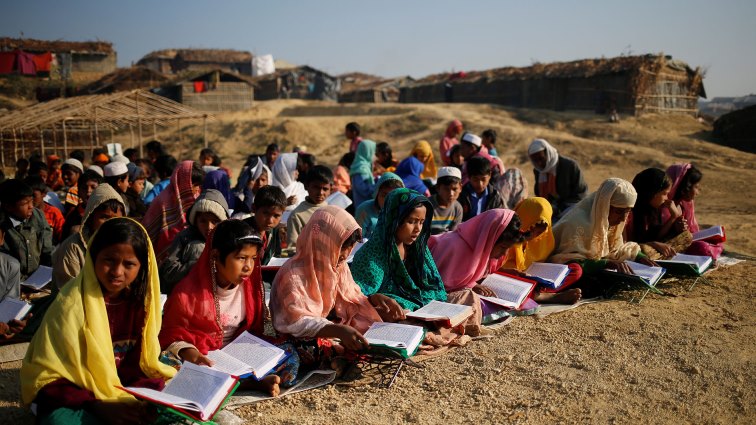Muslim Rohingya continue to flee Myanmar’s Rakhine state, many testifying about violence, persecution, killings and burning of their homes by soldiers and Buddhists, the United Nations human rights chief said on Wednesday.
Zeid Ra’ad al-Hussein, in his final remarks to the Human Rights Council before stepping down on Aug 31, questioned a top Myanmar official’s assertion that the government was committed to defending the rights of all, not those of any one community.
“In my four years as High Commissioner I have heard many preposterous claims. That claim is almost in its own category of absurdity,” Zeid said. “Have you no shame, sir, have you no shame? We are not fools.”
The Myanmar official, Kyaw Moe Tun, director-general of its foreign ministry, did not reply to Zeid’s comments which closed the two-hour debate. After the session he could not be reached for comment.
Earlier, Kyaw said during the debate that Zeid’s report contained information that was “distorted or exaggerated”. He blamed the violence on militants who attacked Myanmar government forces.
“The root cause of the tragedy was terrorism and terrorism cannot be condoned under any circumstance,” Kyaw said.
So far this year, 11,432 Rohingya have reached Bangladesh, where more than 700,000 have fled since an August military crackdown in Myanmar’s northern Rakhine state, Zeid said.
“No amount of rhetoric can whitewash these facts. People are still fleeing persecution in Rakhine — and are even willing to risk dying at sea to escape,” he said.
Many Rohingya refugees also report being pressured by Myanmar authorities to accept a national verification card that says they need to apply for citizenship, he added.
The citizenship issue is at the core of discussions on their status, Zeid said, adding that the cards “mark the Rohingya as non-citizens, in keeping with the government’s characterisation of them as foreigners in their own homeland”.
Authorities in mainly Buddhist Myanmar deny carrying out large scale human rights abuses, which the United Nations has described as ethnic cleansing. Authorities say a crackdown in Rakhine is a necessary response to violence by the Arakan Rohingya Salvation Army (ARSA) militant group, which attacked Myanmar security posts.
Kyaw said a top priority for his government was to find a “sustainable solution” in Rakhine. It had agreed with Bangladesh in January 2018 that repatriation of refugees would be completed within two years, he said.


